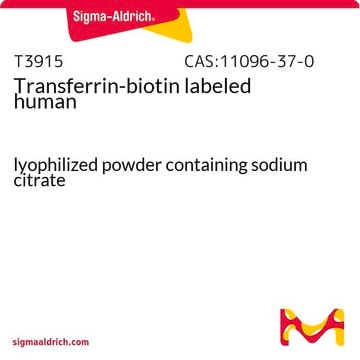T4GENE32-RO
Roche
T4 Gene 32 Protein
from Escherichia coli(infected with phage T4amN134/amBL292/amE218), solution, optimum pH ~8.0
Synonyme(s) :
gene 32 protein, t4
Se connecterpour consulter vos tarifs contractuels et ceux de votre entreprise/organisme
About This Item
Code UNSPSC :
12352202
Produits recommandés
Source biologique
Escherichia coli (infected with phage T4amN134/amBL292/amE218)
Niveau de qualité
Forme
solution
Conditionnement
pkg of 100 μg (10972983001)
pkg of 500 μg (10972991001)
Fabricant/nom de marque
Roche
pH optimal
~8.0
Température de stockage
−20°C
Catégories apparentées
Description générale
T4 Gene 32 Protein is reported to improve the yield of long PCR products when 0.5 to 1.0 nmol of the protein is included in the reaction. T4 Gene 32 Protein is also reported to increase the yield of PCR products amplified from samples that contain humic acid. The inhibitory effect of humic acid is reduced by a factor of 7 when T4 Gene 32 Protein is included in the PCR (at a concentration of 2.5 μg/100 μl).
The protein is isolated from the triple-mutant T4amN134/ amBL292/ amE 219 defective for the T4 genes 33, 35, and 58 to 61.
The protein is isolated from the triple-mutant T4amN134/ amBL292/ amE 219 defective for the T4 genes 33, 35, and 58 to 61.
Spécificité
T4 gene 32 protein is a single-strand specific, helix-destabilizing protein encoded by gene 32 of the phage T4 genome. It is required for the replication of DNA and genetic recombination in Escherichia coli cells that are infected with T4 bacteriophage.
Application
T4 Gene 32 Protein is a single-strand-specific DNA-binding protein. It may be used for:
- Optimization of PCR (See "Product Description" below.)
- Stimulation of in vitro DNA synthesis
- Stabilization of single-stranded regions of DNA or RNA
- Site-specific mutagenesis experiments (with T4 DNA polymerase and T4 DNA ligase)
- Helping restriction enzyme digestions go to completion
- q-PCR
Qualité
Absence of contaminants
T4 gene 32 protein is incubated with various nucleic acids that serve as potential nuclease substrates. Results are analyzed by gel electrophoresis. Based on these tests, none of the following are detectable in the preparation according to the current Quality Control procedures:
T4 gene 32 protein is incubated with various nucleic acids that serve as potential nuclease substrates. Results are analyzed by gel electrophoresis. Based on these tests, none of the following are detectable in the preparation according to the current Quality Control procedures:
- nonspecific exo- and endonucleases
- single-strand DNases (nicking activities)
- single-strand-specific exonucleases
- RNases
Forme physique
Protein solution, 1 - 10mg/ml, in storage buffer (20mM Tris-HCl, 100mM NaCl, 1mM EDTA, 0.5mM DTT, 50% glycerol [v/v], pH approximately 8.0)
Notes préparatoires
Working concentration: 1 to 10 mg/ml
Autres remarques
For life science research only. Not for use in diagnostic procedures.
Code de la classe de stockage
12 - Non Combustible Liquids
Classe de danger pour l'eau (WGK)
WGK 1
Point d'éclair (°F)
No data available
Point d'éclair (°C)
No data available
Faites votre choix parmi les versions les plus récentes :
Déjà en possession de ce produit ?
Retrouvez la documentation relative aux produits que vous avez récemment achetés dans la Bibliothèque de documents.
M Bittner et al.
The Journal of biological chemistry, 254(19), 9565-9572 (1979-10-10)
Detailed procedures are presented which allow reproducible preparation of T4 gene 32 protein, a helix-destabilizing protein essential for DNA replication and genetic recombination in T4 bacteriophage-infected Escherichia coli cells. Although 32 protein can be purified to better than 99% homogeneity
Pauline Jacob et al.
International journal of environmental research and public health, 12(3), 2967-2983 (2015-03-13)
A two-year monitoring program of Cryptosporidium parvum oocysts, Giardia duodenalis cysts, Escherichia coli, Clostridium perfringens spores and adenovirus was conducted in three large rivers in France used for recreational activities and as a resource for drinking water production. Fifty-liter river
Notre équipe de scientifiques dispose d'une expérience dans tous les secteurs de la recherche, notamment en sciences de la vie, science des matériaux, synthèse chimique, chromatographie, analyse et dans de nombreux autres domaines..
Contacter notre Service technique








